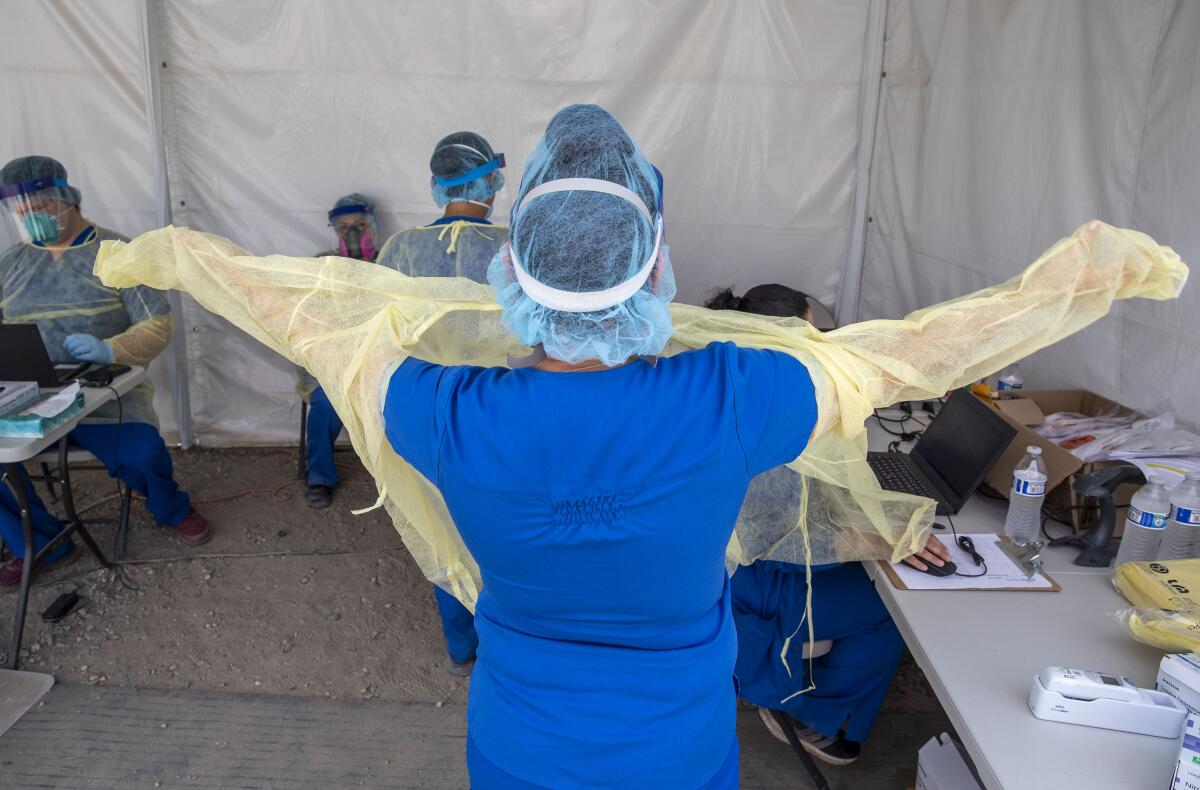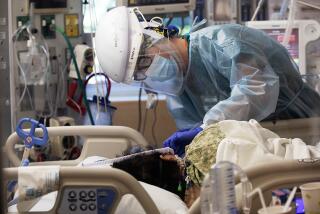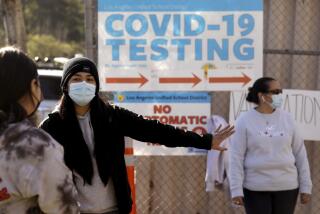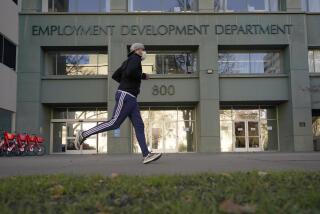California paid a price for mask shortage in dollars and lives, coronavirus study finds

At least 15,800 essential workers would not have contracted COVID-19 if California had stockpiled enough masks and other protective equipment, while the state would have saved $93 million weekly on unemployment claims for out of work healthcare workers and avoided overpaying for supplies, according to a UC Berkeley Labor Center study released Wednesday.
The study urges California officials to stockpile masks, gowns, gloves and other equipment in the coming years to avoid shortages seen during the COVID-19 pandemic. Lawmakers currently pushing a bill that would create a state stockpile said the UC Berkeley report demonstrates that California needs a plan to ensure personal protective equipment shortages aren’t as sharply felt during a future healthcare crisis.
“What this UC Berkeley study shows is the cost of not being ready is very high,” said state Sen. Richard Pan (D-Sacramento), who along with state Sen. Connie Leyva (D-Chino) authored Senate Bill 275 to create a state stockpile of masks and other supplies.
“How do you say, looking at these numbers, we don’t need to do this?” Leyva said of the bill, which is making its way through the Legislature.
The UC Berkeley report, which received no outside funding, says California likely spent around $93 million in unemployment benefits every week for healthcare workers who were unable to work when the state suspended elective surgeries and limited other nonemergency care to reduce the spread of COVID-19 and preserve masks for the most critical care.
Between March 15 and July 11, approximately 251,100 healthcare workers in California filed an initial unemployment claim. Most worked in outpatient care, according to data provided to the report’s authors from the California Employment Development Department, which processes jobless claims.
The study also found that dozens of deaths of essential workers could have been prevented if there was adequate personal protective equipment, with the report’s authors saying their “conservative estimate” was that “at least 15,800 essential worker-related COVID-19 cases may have been avoidable.”
“It was one shocking number after another as I looked at this,” said report co-author William Dow, a professor of Health Policy and Management in the School of Public Health at UC Berkeley. “Based on these numbers, we should be building a stockpile for the future.”
Under then-Gov. Arnold Schwarzenegger, California spent hundreds of millions of dollars buying and storing equipment and supplies needed for a large-scale emergency, such as a public health crisis or natural disaster. With the threat of avian flu in 2006 as the impetus behind the effort, the state assembled a cache of needed supplies, including 50 million N95 respirators, according to a Center for Investigative Reporting story published in The Times.
However, in 2011 the state cut off money for storing and maintaining the stockpile under then-Gov. Jerry Brown. By the time COVID-19 began spreading in California earlier this year, there were 21 million masks in the state’s stockpile — but the equipment had expired and was ultimately only approved for low-risk settings.
Buying new supplies during the pandemic left the state paying huge markups on some supplies, the UC Berkeley study found. A single surgical mask, for example, cost 5 cents during nonpandemic times, the report said, citing multiple published and unpublished pricing sources. The price rose to 55 cents each during the pandemic. Highly sought-after N95 masks also jumped in cost, with the midpoint price for a 3M-brand respirator selling for $1.27 before the pandemic. Early in the pandemic, the cost of N95 masks skyrocketed, even on bulk orders, to around $5.90 each, according to the study.
A Times review of hundreds of contracting records in April showed state agencies — and ultimately the state’s taxpayers — were paying steep prices for masks as suppliers and middlemen cashed in on the global shortage.
The Times’ analysis found state agencies paying as much as $12.74 for each N95 mask. Gov. Gavin Newsom signed an executive order in April banning price gouging on medical gear, but vendors willing to sell to the state or local governments were exempted from the directive. That exemption was included out of concernthat the consumer protections would scare off vendors at a time when the state needed the supplies.
Last month, Newsom announced the state would begin creating a stockpile of 100 million N95 respirators and 200 million surgical masks for the early fall to help the state prepare for a likely increase in cases of COVID-19.
SB 275 would keep the stockpile going beyond the current crisis, its supporters said. The bill requires the state to stockpile a 90-day supply of medical supplies over the next five years, with hospitals and other healthcare employers required to assemble their own 90-day supply by June 1, 2023. The bill carries a $25,000 fine for failing to maintain sufficient inventory of unexpired medical supplies.
The California Hospital Assn., however, said the bill will require healthcare employers to start building a supply too soon, potentially taking away equipment currently needed by front-line workers. The bill requires healthcare employers to build a 30-day supply by June 1, 2021.
“They would need to begin to ramp up purchasing during the pandemic and this will put incredible strain on the supply chain, impacting pricing and availability of resources for all front line workers,” said Kathryn Scott of the California Hospital Assn. during committee testimony late last month.
The association also said it is concerned the bill would discourage healthcare employers from sharing their masks and other supplies during emergencies.
The California Orthopedic Assn. said the bill would generate significant waste as expired protective equipment is discarded.
Gabriel Montoya, an emergency medical technician in Downey, said after months of personally feeling the impact of a mask shortage, he is glad there are efforts to build a stockpile for the future.
“We can’t wait for the next pandemic to start building the infrastructure to have these supplies,” said Montoya, a member of Service Employees International Union California, which is sponsoring the bill. “We have to start doing that now.”
More to Read
Start your day right
Sign up for Essential California for news, features and recommendations from the L.A. Times and beyond in your inbox six days a week.
You may occasionally receive promotional content from the Los Angeles Times.







